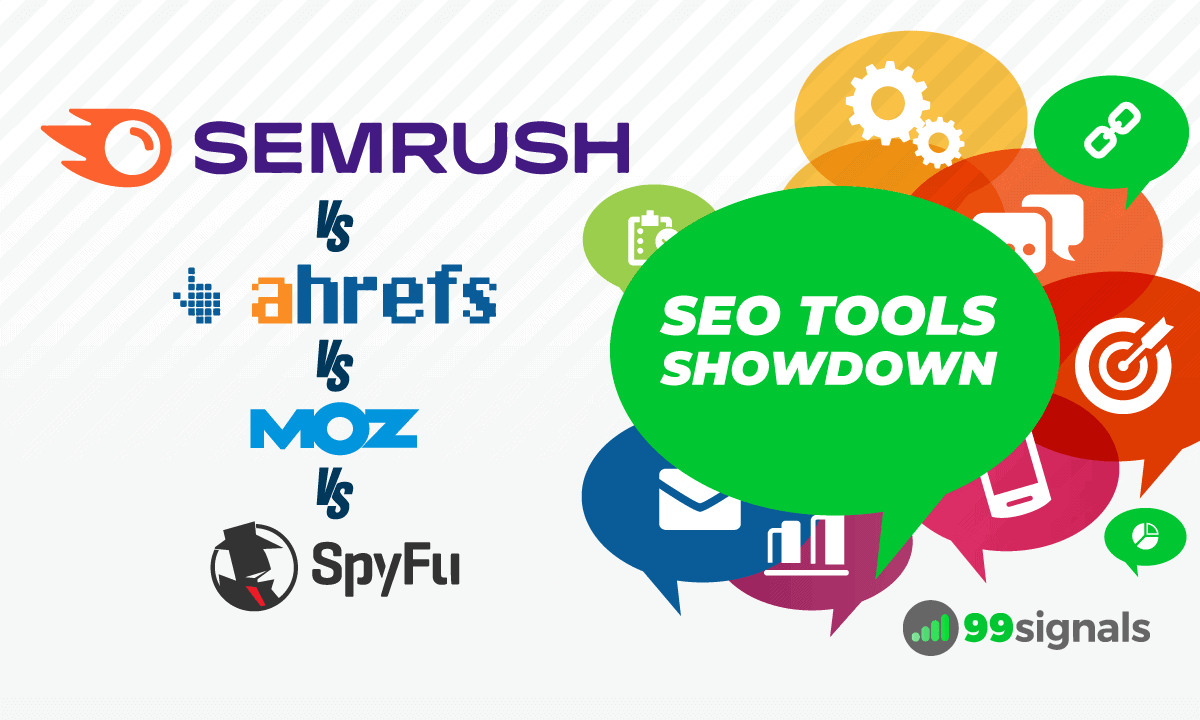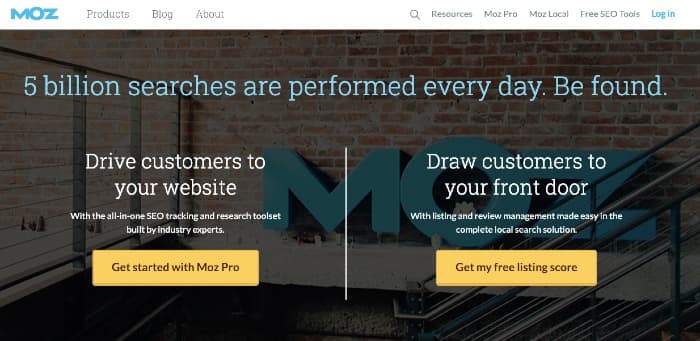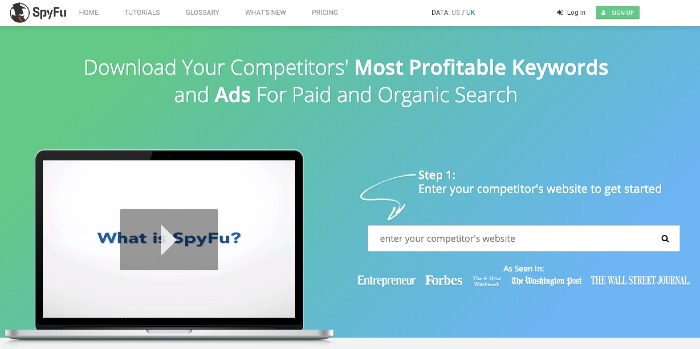Done? What did you find? Chances are you found listicles that featured one or all of these tools on page 1 of Google SERPs — Semrush, Ahrefs, Moz Pro, and SpyFu. Chances are you found Semrush, Ahrefs, Moz, and SpyFu featured in almost all the articles. You may have also seen mentions of SE Ranking SEO Software on some of these posts. Another tool that you may have found is GrowthBar — an SEO tool launched in 2020 that everyone in the SEO world is raving about. Here’s the thing: these tools have dominated the SEO scene for the last few years and will continue to do so as they evolve and add more features to help you improve your rankings and traffic. In this article, I’ll put each of these tools under the microscope and help you decide whether it’s worth investing in them. For all these tools, I’ll reveal their key features, pros and cons, pricing, and ratings on popular reviews sites such as G2Crowd, TrustRadius, and Capterra. Let’s get started.
#1 Semrush
Semrush is the world’s leading keyword research and competitor analysis service for online marketing and one of the most popular SEO tools on the market. It’s my go-to tool for all SEO-related tasks. Semrush allows you to do keyword research, backlink audit, competitor analysis, technical SEO audit, and much more. Using Semrush is a sure-fire way to climb up search rankings and dominate your niche.
Key Features
For the complete list of Semrush features, refer to this page. Listed below are some of the tool’s key features:
Keyword Magic Tool – Includes over 20 billion keywords in its database, making it the largest keyword database on the market. The tool provides keyword variations for your target keywords and presents an accurate summary of important keyword metrics like search volume, keyword difficulty score, CPC, and so on. Site Audit Tool – Identify and fix technical SEO issues on your website. Position Tracking – Track your and your competitors’ rankings for your target keywords. Widely credited as the most accurate position tracking tool on the market. Content Marketing Toolkit – Features 6 content creation and optimization tools to help you level up your content and beat even the most authoritative competitors in the SERPs. Competitor Research Toolkit – Includes tools to track your competitors’ SEO and PPC campaigns and helps you reverse-engineer your competitors’ best keywords and backlinks. Traffic Analytics, an add-on tool, provides accurate traffic metrics for any domain and lets you benchmark your traffic against your top competitors’ traffic. Backlink Audit Tool – Identify and eliminate toxic backlinks to avoid Google penalty. SEO Reports – Download customizable PDF reports to better organize your SEO and PPC research data.
Pros
Easily the best competitive intelligence tool on the market. Helps you uncover your competitors’ SEO as well as PPC strategies. The On Page SEO Checker tool (formerly called “SEO Ideas”) offers an in-depth list of things you can do to optimize rankings for your target keywords — from semantically related words to include in your posts to backlink prospects to recommendations on target content length and readability. The Site Audit tool helps you identify on-page and technical SEO errors and warnings on your website, and provides you with a comprehensive list of recommendations to improve the overall SEO health of your site. Semrush is the gold standard of keyword research platforms. The Keyword Magic Tool helps you pick the most profitable keyword in your niche and generates a boatload of keyword ideas for your seed keywords.
Cons
A steep learning curve. It takes time to learn and master all the features. The Backlink Analytics tool lacks the accuracy and comprehensiveness of Ahrefs’ Site Explorer.
Semrush Pricing
Pro – $119.95/mo (Ideal for beginners and bloggers) Guru – $229.95/mo (Ideal for small business owners and solopreneurs) Business – $449.95/mo (Ideal for marketing agencies and marketing teams in big companies)
Note: By opting for annual pricing, you can save up to $800. Click here to get a 1-month free trial of Semrush Pro ($119.95 value)
Semrush Reviews and Ratings
G2 – 4.6/5 (1,500+ reviews) TrustRadius – 9/10 (550+ reviews) Capterra – 4.7/5 (1,800+ reviews)
- Last update: May 2022
Semrush: Final Verdict
If you had to choose just one service out of these four, go with Semrush. Semrush is the ultimate SEO tool that helps you unlock the most profitable keywords for your business or blog, and helps you gain a deeper understanding of your competitors’ search and PPC tactics to rank higher in SERPs. Try Semrush Pro for free Visit their website Side note: Semrush is loaded with features and I’ve gone into detail on most of its SEO, competitor analysis, and content marketing features in my Ultimate Semrush Playbook, which you can download for free by clicking the link below. Download the Ultimate Semrush Playbook for FREE
#2 Ahrefs
If you’re serious about building high-quality backlinks for your site, Ahrefs is the tool you should invest in. Ahrefs has the best link index among all SEO tools. You can use this tool to unearth your competitors’ backlink profile and build your own backlinks. In addition to link building, you can also use Ahrefs to track your rankings on Google, perform technical audits, and do keyword research via Keywords Explorer. While the tool has evolved into a full-fledged SEO software, it’s still primarily known for its backlink analysis features.
Key Features
Site Explorer – Get an in-depth look at the organic search traffic and backlink profile of any website or URL. Content Explorer – Discover the most popular content for any topic (by backlinks, organic traffic, and social shares). Alerts – Get notified of new & lost backlinks, web mentions, and keywords rankings. Rank Tracker – Track your desktop and mobile rankings for any location. Get daily/weekly/monthly reports. Domain Comparison – Compare the backlink profiles of up to 5 different domains. Content Gap – Find the keywords your competitors rank for, but you don’t.
Pros
Second-to-none backlink analysis. Rank tracker is accurate and reliable. Email alerts help you keep track of new and lost backlinks as well as rankings of your site for important keywords. The latest iteration of Keywords Explorer sets high standards for keyword research. Excellent outreach tool which works well in combination with other content marketing tools such as BuzzSumo and Mailshake. The UI is slick and user-friendly.
Cons
The Site Audit tool is a mess, taking hours to produce an audit report. Lacks SEO reporting features. Expensive compared to other standalone link building tools such as Majestic SEO and Linkody. No free trial. You need to pay $7 to try the tool for one week.
Ahrefs Pricing
Lite – $99/mo (Ideal for beginners and solopreneurs) Standard – $179/mo (Ideal for experienced bloggers) Advanced – $399/mo (Ideal for SEO agencies) Agency – $999/mo (Ideal for marketing agencies with a big clientele)
Note: By signing up for annual plans, you get 20% off.
Ahrefs Reviews and Ratings
G2 – 4.6/5 (400 reviews) TrustRadius – 8.7/10 (290+ reviews) Capterra – 4.7/5 (300+ reviews)
- Last update: May 2022
Ahrefs: Final Verdict
When it comes to backlink analysis, Ahrefs is the best there is. Despite being on the pricier side, it’s well worth investing in this tool because of the strong ROI. Visit their website Check out our full review of Ahrefs here. Recommended reading: Semrush vs Ahrefs: Which SEO Tool is Better?
#3 Moz
Started by Rand Fishkin aka the Wizard of Moz back in 2004, Moz is perhaps the most popular SEO tool in this list, owing to the cult-like popularity of Fishkin in the marketing space. Moz relies heavily on SEO metrics such as Domain Authority and Page Authority to give you insights on link equity, keyword rankings, page optimization reports, and more. Despite all these features, Moz has not evolved or improved much in recent years, especially since Fishkin’s departure from the company in 2018.
Key Features
For the full list of features, refer to this page. Here are some of the key features of Moz you should know about:
Global Rank Tracking – Track keywords weekly for Google, Bing, and Yahoo in 200+ countries, plus segment them by campaign, keyword label, and location. Keyword Research – Discover and prioritize the best keywords to target for your site Link Profile Analysis – Access and evaluate the most important links on the web with our industry-leading metrics. Site Crawl – Identify SEO errors and get recommendations on how to fix them to improve your site’s overall SEO health. Page Optimization – Search top-performing content across the web to find winning strategies and accelerate your content efforts. Reporting – Prove and improve your impact on site traffic.
Pros
The Site Audit tool includes a neat little section called “Moz Recommends Fixing” where SEO experts from Moz provide actionable steps to fix 3 critical issues on your site. Page Optimization feature allows you to identify and fix on-page issues with your site and boost search rankings. Excellent customer support. 1-on-1 product walkthrough available for all plans.
Cons
Search volume data can be confusing. The site audit reports are unremarkable, failing to spot even the most common SEO errors. Backlink data can sometimes be inaccurate. Steep learning curve. This is not a beginner-friendly tool. It takes time to get used to all its features. Outdated and clunky UI.
Moz Pricing
Standard – $99/mo (Ideal for bloggers and solopreneurs) Medium – $179/mo (Ideal for bloggers) Large – $249/mo (Ideal for SEO agencies) Premium – $599/mo (Ideal for marketing agencies with a big clientele)
Note: You can save 20% on any of the above by opting for yearly plans.
Moz Reviews and Ratings
G2 – 4.4/5 (350+ reviews) TrustRadius – 8.4/10 (350+ reviews) Capterra – 4.5/5 (300+ reviews)
- Last update: May 2022
Moz: Final Verdict
Despite having a wealth of SEO resources on their blog and a top-notch YouTube channel, Moz is the weakest all-purpose SEO tool on the list. Since we are evaluating these tools on their features and pricing, and not the kind of content they produce, Moz is simply not worth paying $100 a month. I’d much rather spend that money on Semrush or Ahrefs. Click here to try Moz Pro for free for 30 days Visit their website Recommended reading: Semrush vs Moz: Which is the Best SEO Tool?
#4 SpyFu
Launched in 2006 by Mike Roberts, SpyFu is a competitive intelligence tool for online marketers. SpyFu offers deep insights into both SEO and PPC, and helps you improve your search rankings by tapping into your competitors’ keyword strategies.
Features
SEO Research – Improve your search rankings by tapping into your competitors’ keyword strategies. PPC Research – Discover the competition’s most lucrative keywords that you’re missing. Competitor Research – Type your competitor’s domain into SpyFu and get deeper insights.
Pros
The plans come with a 30-day money-back guarantee. SpyFu’s free plan lets you perform unlimited searches. More economical than most competitive intelligence tools in the market.
Cons
The tool has not evolved beyond offering basic competitive intelligence data. Pales in comparison to its chief rivals. No free trial on any of the paid plans. Outdated UI.
SpyFu Pricing
Basic – $39/mo Professional – $39/1st month, $78/mo thereafter Business – $299/mo
SpyFu Reviews and Ratings
G2 – 4.6/5 (480+ reviews) TrustRadius – 8.1/10 (100+ reviews) Capterra – 4.5/5 (100+ reviews)
- Last update: May 2022
SpyFu: Final Verdict
SpyFu is a decent competitive research and keyword analysis tool. With paid plans starting at $39/month, it’s also one of the most competitively priced SEO products on the market. Having said that, the tool certainly has limitations. The data you get is not always accurate and the UI looks and feels outdated. Nevertheless, if you want a reliable SEO competitor analysis tool that’s not too heavy on the pocket, you should try SpyFu. Click here to sign up for SpyFu’s free plan Visit their website Recommended reading: Semrush vs SpyFu: Which SEO Tool is Better for Competitor Analysis?
Conclusion
That wraps up this comparison post. We hope you are now more informed about each of these SEO tools and your decision to invest in one (or more) of these is made that much easier. If you liked this article, please share it on Twitter using the link below: Editor’s Note: This article was first published on February 6, 2017 and has been updated regularly since then for relevance and comprehensiveness.
Semrush vs Moz: Which SEO Tool is Better? Semrush vs SpyFu: Which Competitor Analysis Tool is Better? Semrush vs Ubersuggest: Which SEO Tool is Better? 25 of the Best Chrome Extensions for SEO Semrush vs Ahrefs: Which SEO Tool is Better?





